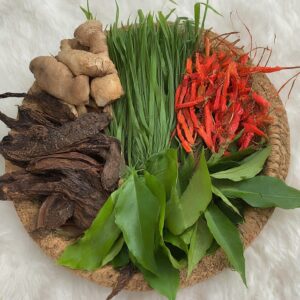7 Indigenous Herbs in Nigeria: Natural Health Benefits
Nigeria, a country rich in natural resources, is home to a diverse range of indigenous herbs that have been used for centuries to promote health and wellbeing.
These herbs, often overlooked in modern times, hold the key to unlocking the secrets of natural health and wellness.
In this article, we will explore 7 indigenous herbs in Nigeria that are packed with health benefits and how they can be used to improve your overall health.

7 Indigenous Herbs and their benefits
Scent Leaf (Ocimum gratissimum)
Scent leaf, also known as efirin in Yoruba, nchuanwu in Igbo, and daidoya in Hausa, is a popular herb in Nigerian cuisine and medicine. Among the 7 indigenous herbs in Nigeria, the Igbos are known to use this for special delicacies.
It is rich in antioxidants and has anti-inflammatory properties, making it an effective remedy for digestive issues, fever, and respiratory problems. The high antioxidant content in scent leaf helps protect the body from oxidative stress, while its anti-inflammatory properties can reduce symptoms of colds and flu.
This herb is also known for its antibacterial and antifungal properties, which can help in treating infections.
Bitter Leaf (Vernonia amygdalina)
Bitter leaf, known as ewuro in Yoruba, onugbu in Igbo, and shuwaka in Hausa, is the most popular amongst the 7 Indigenous Herbs in Nigeria as it is another powerful herb used in traditional Nigerian medicine.
It is packed with vitamins A, C, and E, along with essential minerals like calcium and iron. Bitter leaf has been traditionally used to treat fever, malaria, and various skin conditions.
Its anti-inflammatory and antioxidant properties help detoxify the body, boost the immune system, and promote healthy skin. Additionally, bitter leaf is known to aid digestion and improve liver health.
Neem Leaf (Azadirachta indica)
Neem leaf, known as dogonyaro in Yoruba and Hausa, and ogwu akom in Igbo, is revered for its numerous medicinal properties.
This herb is a natural pest repellent and has been used in traditional medicine for centuries. Amongst the 7 indigenous herbs in Nigeria, the Yorubas mostly use it for traditional medicine and diabetics management.
Neem leaf is rich in antioxidants and has anti-inflammatory properties, making it effective in treating skin conditions, fever, and respiratory problems. It is also known for its antimicrobial properties, which can help combat infections and support overall immune health.
Ginger (Zingiber officinale)
Ginger, called ata-ile in Yoruba, jinja in Igbo, and citta in Hausa, is celebrated for its numerous health benefits. It is rich in antioxidants and possesses strong anti-inflammatory properties.
Ginger is commonly used to alleviate digestive issues, reduce nausea, and treat respiratory problems. It also has immune-boosting properties, making it a popular remedy during cold and flu seasons.
Regular consumption of ginger can help improve digestion, reduce inflammation, and enhance overall wellbeing.
Turmeric (Curcuma longa)
Turmeric, known as atale pupa in Yoruba, turmeric in Igbo, and kurkur in Hausa, is a potent herb used in traditional medicine. It contains curcumin, a compound with powerful antioxidant and anti-inflammatory effects. Turmeric is commonly used to treat joint pain, digestive issues, and skin conditions. Its anti-inflammatory properties can help reduce symptoms of arthritis and other inflammatory conditions. Turmeric is also known for its potential to support brain health and improve mood.
Lemon Grass (Cymbopogon citratus)
Lemon grass, called koriko oba in Yoruba, achara ehi in Igbo, and tsawar masar in Hausa, is one of the 7 Indigenous Herbs in Nigeria that offers a range of health benefits.
It is rich in antioxidants and has anti-inflammatory properties, making it effective in treating digestive issues, fever, and respiratory problems.
Lemon grass is also known for its calming and soothing effects, making it a popular remedy for stress and anxiety. Additionally, it can aid in detoxification and support healthy digestion.
Sickle Pod (Senna occidentalis)
Sickle pod, known as agbararo in Yoruba, ncha in Igbo, and tafasa in Hausa, has been used in traditional medicine for centuries.
This herb is rich in antioxidants and has anti-inflammatory properties, making it effective in treating digestive issues, fever, and respiratory problems. Sickle pod is also known for its laxative effects, which can help relieve constipation and improve bowel movements.
Its detoxifying properties make it a valuable herb for cleansing the body and promoting overall health.
Conclusion
These 7 indigenous herbs in Nigeria are packed with health benefits and have been used for centuries to promote health and wellbeing.
By incorporating them into your diet and lifestyle, you can unlock the secrets of natural health and wellness. Remember to always consult with a healthcare professional before using any herbal remedies, especially if you have underlying health conditions or are pregnant or breastfeeding.
Embrace the power of nature and discover the incredible health benefits of these indigenous Nigerian herbs.
To purchase Moringa herb or any other herbs beneficial to your health, visit our online store by clicking here.

![]()




